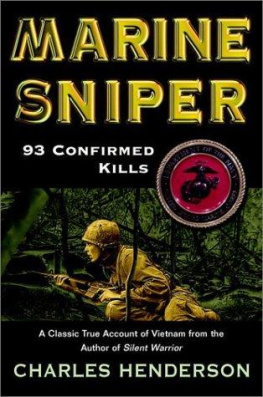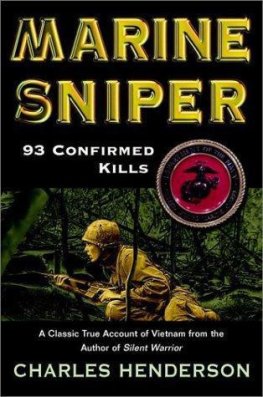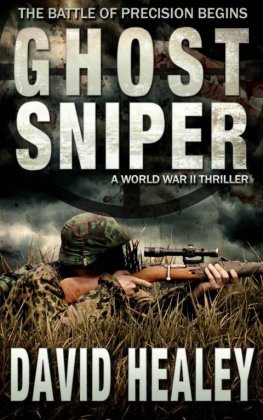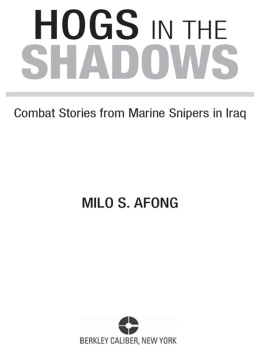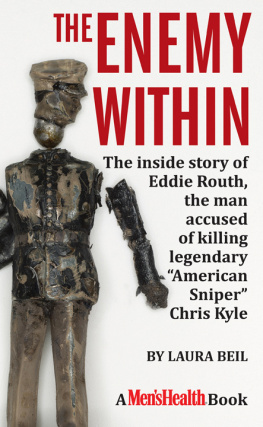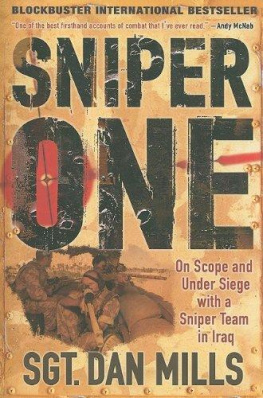MARINE
SNIPER
93 CONFIRMED KILLS
CHARLES HENDERSON
ACKNOWLEDGMENTS
No author has ever written a book totally alonesomewhere along the line, he had assistance. In most cases, that assistance has been great. This book is no exception.
First, I thank Raymond B. Lech, a fellow author who introduced my work to Sol Stein and then guided me over the first hurdles of being published. I will be eternally grateful to Ray for that.
Thanks to my editor, Bill Fryer, for boiling down more than seven hundred pages of manuscript and leaving the content and focus of Carlos Hathcock's story intact.
And thank you, Sol Stein, for your faith in me as a writer.
Special thanks go to Lt. Col. David Willis, a distinguished marksman and one of the finest Marines I have ever had the pleasure of knowing. He had faith in my integrity and introduced me to Carlos Hathcock. He assured Carlos that I was a man of honor and worthy of his trust. Without that, I am certain that Carlos would never have consented to reveal to me his most private and deeply held personal experiences.
Thanks are not enough for Maj. E. J. Land. He gave me many, many hours of his time, assisted me in my research, and opened his private library to me.
But above all, he opened his soul and let me see a very personal pan of his life. He told me about it in detail and withheld nothing that I requested.
Also, I cannot forget Sgt. Maj. David Sommers, M. Gunnery Sgt. Ron McAbee, and David Holden, who freely gave bits and pieces of their past to me.
The Historical Division at Headquarters, U.S. Marine Corps, also provided invaluable assistance, especially Ben Frank of the Marine Corps Oral History Branch and Ev Englander of the Marine Corps Historical Center Library.
I thank Lt. Col. Rick Stepien for his assistance, tolerance, and encouragement.
I also say thank you to my family. I occupied their lives with my book for more than a year and a half. I denied them a real family life while I spent all my time, that was otherwise theirs, researching and writing and rewriting.
Last, and most important, I thank Gunnery Sgt. Carlos Hathcock. He refused me nothing: he fed me, gave me his bed, and called me his friend. He shared countless hours with me, opening his heart, telling me the stories now bound in this volume. It is a great honor to know him and a privilege to call him my friend.
For all the snuffies of the Corps, and to the
memory of my brother Marines, Tony, Sammy,
and Iron Mike
FOREWORD
To be a nationally recognized shooting champion takes a special kind of individual. To be effective on the battlefield as a sniper requires even more extraordinary qualities.
Gunnery Sergeant Carlos Hathcock is one of those rare individuals who has carved a niche in Marine Corps history by being both.
It takes a special kind of courage to be alone: to be alone with your thoughts; to be alone with your fears; to be alone with your doubts. This courage is not the superficial brand stimulated by the flow of adrenalin. Neither is it the courage that conies from the fear that others may think one a coward.
It is the courage born of honor.
Honor on the battlefield is a sniper's ethic. He shows it by the standards and discipline with which he lives life in combat. By the decency he shows his comrades. And by the rules he adheres to when meeting the enemy.
The sniper does not hate the enemy; he respects him or her as a quarry.
Psychologically, the only motives that will sustain the sniper is the knowledge that he is doing a necessary job and the confidence that he is the best person to do it. On the battlefield hate will destroy any manand a sniper quicker than most.
The sniper is the big-game hunter of the battlefield, and he needs all the skills of the woodsman, marksman, hunter, and poacher. He must possess the field craft to be able to position himself for a killing shot, and he must be able to effectively place a single bullet into his intended target.
Gunnery Sergeant Hathcock was all of these things with a full measure of the silent courage and quiet optimism of a true champion.
The war in Viet Nam was ideally suited to sniper warfare. However, the rules of engagement and a lack of understanding of the sniper's role made his effective employment a constant struggle. The struggle continues.
Sadly, there are few officers in the United States Armed Forces today who understand even the basic rudiments of marksmanship, much less sniping.
Thus they cannot possibly understand the potential of this flexible, versatile, and cost efficient fighting asset. Sniping has a history extending from the Renaissance achievements of Leonardo da Vinci who, standing on the walls of besieged Florence, picked off enemy soldiers with a rifle of his own design and of Benvenuto Cellini who, during the siege of Rome in 1527, sniped the enemy commander, the Constable de Bourbon, to the modern era and Hathcock's 93 confirmed kills in Viet Nam, which included high-ranking commanders.
At the beginning of every conflict in this century there has been a slowly dawning realization of the need for snipers, and at the end of every conflict there has been an effort to put that genii back in its bottle. Not only has the officer corps showed little understanding of the support and employment techniques necessary to the successful deployment of the weapons system we call a sniper, but because of weak stomachs, or a desire to conciliate others with weak stomachs, they have attempted to suggest that sniper warfare is morally wrong and unworthy of a role in the United States Armed Forces. The only reply to that must be that it is doubtful if it is either reasonable or moral to import the standards of Hollywood westerns, in which the good guys never shoot first, onto the battlefield.
I'm comfortable in my mind that there is little hope for understanding from the old guard. However, I pray that the young officers of today will read this book with an inquisitive mind. I hope that they will look at the requirements of the modern battlefield and see the great potential of the sniper system.
Hopefully, they will see that the success and effectiveness of the sniper is limited only by one's imagination.
There can be little doubt that Gunnery Sergeant Hathcock was effective in his role as a sniper. What is not widely known is that he became the focal point of a staff effort to legitimize sniping.
I was the marksmanship coordinator in the Office of Training at Headquarters, United States Marine Corps, from 1975 through 1977. During this period we staffed a proposal for a permanent table of organization and table of equipment for the sniper unit.
There was a strong effort at this time to delete the sniper program from the Marine Corps. As a result, I conducted a personal lobbying program that extended from the handball courts to the briefing rooms; from the Officer's Club at Quantico to seminars on urban warfare. There, Carlos became the symbol of what could be.
Carlos's story was told again and again. It added credibility to the too often impersonal and unimaginative thought processes used by a major staff.
Carlos Hathcock not only sparked but inflamed the imaginations of many who would have removed all traces of sniping from the Marine Corps. His real-life heroics served as a demonstration of what could be accomplished with proper training, equipment, and leadership.
Eventually, through the efforts of many men, a permanent sniper table of organization and table of equipment within every Marine Division was established, and approval was given for what has become the finest school on the art of sniping in the world. Without Hathcock's story and without his courage, perhaps none of this would have come to pass.
E. J. LAND Major, U.S. Marine Corps (Retired)
Next page
